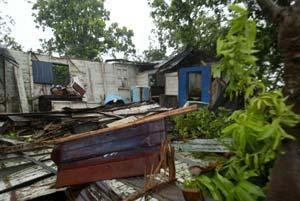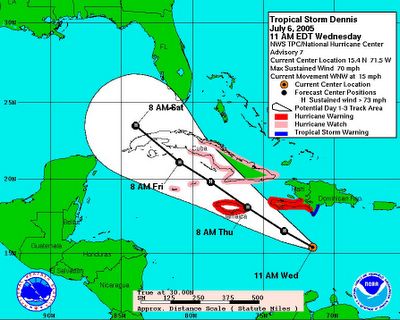Never mind the serious issues facing the people of Cuba these days: no power, lack of food, lack of adequate housing, etc. It doesn't matter to
el maximo lider, it's all about him. fidel went on his usual self-aggrandizing rampage yesterday, this time to commemorate the Moncada Barrack attack of July 26th, 1953.
The Sun-Sentinel's Vanessa Bauza gives her usual soft take on news in Cuba with
this article:
HAVANA · President Fidel Castro commemorated the 52nd anniversary of his revolution by taking aim at his nemesis, the Bush administration, and bitterly accusing it of financing and promoting recent anti-government dissident demonstrations.Addressing an auditorium full of Communist Party leaders and handpicked supporters, Castro called the top U.S. diplomat in Havana a "grotesque character," and sternly warned that future protests planned by Cuba's dissidents will be thwarted "as many times as necessary."
"The supposed opposition in Cuba does not exist except in the feverish minds of the Cuban-American mafia and the bureaucrats of the White House and the State Department," Castro said a four-hour speech at Havana's Karl Marx Theater on Tuesday night. "They deceive themselves ... with their own lies."He referred to two demonstrations this month in which
dozens of dissidents were detained and declared that his enemies are mistaken if they think his government is on its last legs (
Emphasis mine - they weren't just detained Vanessa, they were also beaten, here's proof).Castro, who turns 79 next month, also promised improvements to Cuba's decayed infrastructure and dilapidated housing. Many of the island's 11 million residents have been plagued by frequent power outages this summer, forcing them to make do without electric fans and refrigerators in scorching heat. Responding to widespread discontent over the blackouts, Castro said the Cuban government has invested $282 million in equipment and material to improve outdated power plants. He predicted Cuba's electrical output would double by the end of the year. "As president of the Council of State and government, I dedicate a significant amount of time to this problem," Castro said. "I am not exaggerating what I have said."All I ask is that you have a little confidence."
Cubans in the far eastern and central provinces face the additional burden of rebuilding in the aftermath of Hurricane Dennis, which ripped across fishing villages and agricultural towns earlier this month, killing 16 people, destroying 15,000 homes and causing $1.4 billion in damage. On Tuesday, Castro promised 10,000 homes would be repaired by the end of this year and an additional 100,000 would be built next year.Castro painted a rosy economic picture, in contrast with the persistent hardships and shortages many average Cubans struggle with daily. He said the Cuban economy grew by 7 percent in the first half of 2005, adding that run-down hospitals are being repaired and buses and trains are being imported to ease congested public transportation. Economically, ties with China and Venezuela, coupled with tourism revenues and high prices for nickel, have helped Cuba cope with the tightened U.S. embargo.
University of Florida researcher Paolo Spadoni, who frequently writes on Cuba policies, gave the island's economy mixed reviews."From the U.S. side, Cuba is on its last legs and it looks like the system is going to fall apart tomorrow. On the Cuban side there has been optimism and they've openly said the economy is better because of Chinese and Venezuelan support," Spadoni said. "There are some indicators that the economy is better. I'm not sure how much of that you can see on the street." (
ed: Mr. Spadoni, the answer is - not much.)
Castro's government, meanwhile, faces criticism again from the U.S. government and European Union over the detentions last week of 33 dissidents who planned an anti-government demonstration. So far, 24 of the detained dissidents have been released. Nine others remained in prison Tuesday, said veteran activist Elizardo Sánchez of the nongovernmental Cuban Commission for Human Rights and National Reconciliation."The situation concerning civil, political and economic rights is worse than it was last year," Sánchez said. "The number of detentions without charges is greater than last year. I have never seen so much discontent in Cuban society as there is now. It is not leading to massive protests, but isolated manifestations ... especially during blackouts."
The anniversary marked the July 26, 1953, rebel attack that sparked a popular uprising against former military dictator Fulgencio Batista and launched Castro's revolution.The surprise attack on the Moncada military barracks was a spectacular failure for the rebels, but it is commemorated as one of communist Cuba's most important holidays. At the time, Castro was captured and more than 50 of his compatriots were tortured and executed. At his trial Castro famously declared: "Condemn me; it does not matter. History will absolve me."He echoed that phrase at the end of his speech Tuesday night, proclaiming, "History will absolve us!" in front of an enthusiastic crowd, including American activists who traveled to Cuba in defiance of the four-decade embargo.
![[freedomtowernight_edited.jpg]](https://blogger.googleusercontent.com/img/b/R29vZ2xl/AVvXsEi-x7_mwi5EYyZJxpzNqsvkYATDseYTHIovP09YKrIctspB17DY_5s2AeackCCaZqX14NV-rcs5S81-anUoEkQcrbMqc9hATVpw0uU3hH1tyIbe0iq0Jfe5iTwGlJaoODZXAOt_Kg/s1600/freedomtowernight_edited.jpg)







![[yanomasnew.jpg]](https://blogger.googleusercontent.com/img/b/R29vZ2xl/AVvXsEjEh5xBwYB4BI84Cgkb-4HF_fhmRhKvr_04RHSZ1kySa9-x2qIDzPwZxsOPW8kY2PNWrqOcHIflfvAuq2h5T6bxOkEsPRPtC0eJX4vZAmquZw4-5-lxj2ijw7ygo-8WhjEPdEA2Hw/s1600/yanomasnew.jpg)


